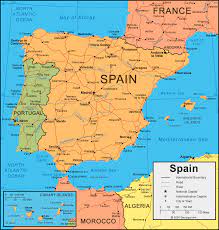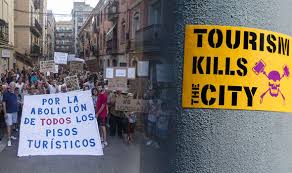Talk about biting the hand that feeds you!
What is The Spanish Fly talking about?
 Large parts of Spain depend on tourism. The costas of the Mediterranean, the Costa de la Luz from Tarifa to Cádiz, Galicia, La Costa Cantábrica and el País Vasco. Away from the beaches there is rural tourism in areas of natural beauty such as inland Andalucía, Aragón, Castilla-León, Castilla-La Mancha, Extremadura.
Large parts of Spain depend on tourism. The costas of the Mediterranean, the Costa de la Luz from Tarifa to Cádiz, Galicia, La Costa Cantábrica and el País Vasco. Away from the beaches there is rural tourism in areas of natural beauty such as inland Andalucía, Aragón, Castilla-León, Castilla-La Mancha, Extremadura.
And what about city tourism?
That’s where the main problem lies.
Anti-tourism demos
 The local inhabitants of several big cities have turned against tourists. From Barcelona to Valencia, from Málaga to Cádiz. Why?
The local inhabitants of several big cities have turned against tourists. From Barcelona to Valencia, from Málaga to Cádiz. Why?
Because local workers feel they have been priced out of the rental market. The availability/supply of rental properties has shrunk since Airbnb and other rental companies came on the scene.
Property owners can make much more from tourists than from a long-term rental contract.
Barcelona has already outlawed Airbnb and other cities are thinking of doing the same.
The Spanish Islands
 The anti-tourism wave on the Spanish Islands, ie the Balearics and the Canary Islands, is somewhat different.
The anti-tourism wave on the Spanish Islands, ie the Balearics and the Canary Islands, is somewhat different.
Fed up with horrendous drunkenness, sh**ging on the streets and generally despicable behaviour, resorts like Palma Nova in Mallorca are trying to clean up their act.
The situation is similar in the more downmarket resorts of Tenerife in the Canaries. The locals have simply had enough of the debauchery.
Demonstrations
It has now got to the point where there are frequent demos against tourists, with hostile banners much in evidence.
At one airport, there were reports of activists trying to discourage northern Europeans from flying to Spain.
“Go to Greece, or Croatia,” they say.
What I think
 Spain’s biggest money-earner is tourism. Hardly surprising, the second largest country in Europe is amazing.
Spain’s biggest money-earner is tourism. Hardly surprising, the second largest country in Europe is amazing.
From Andalucía, the white villages and the beaches; to Galicia and its “rias” (fjords); the Basque Country, with its spectacular scenery and its fabulous cuisine; to Aragón; Huesca; Cataluña; Madrid; País Valenciano; Extremadura; and the Costa de la Luz.
Spain is a country which offers incredible variety. “España es diferente” was the tourism slogan for decades.
So, what to do?
Clearly the tawdry resorts on the islands need to be cleaned up and the drunken riff-raff from the UK (by far the worst culprits), Germany, Finland, the Netherlands, et al discouraged from coming.
But what about the cities on the mainland?
Without tourists and the million or so retired northern Europeans, many places would simply die.
 Take Málaga, for example. Since its make-over of the last dozen years, the city is full of foreigners, both residents and tourists.
Take Málaga, for example. Since its make-over of the last dozen years, the city is full of foreigners, both residents and tourists.
For these, mainly northern Europeans, Spain is much cheaper than their countries of origin, so they are out and about all day long. They love the tapas, the bars and restaurants, the menús del día and the "life-on-the-streets" ambience.
If the powers-that-be “banned” foreigners, many of these establishments would be forced to close.
The Spanish in Málaga can’t afford to patronise bars and restaurants morning, noon and night. They have to work for a living.
If the foreigners, guiris, do not come, many places will be forced to close. Then where would we stand?
Javier Recío argued this very point in a telling article entitled ¿Que sería del centro de Málaga sin los guiris? which was published in Diario Sur on 9 June.
His view is that Málaga and other cities need to find a way to keep the tourists coming, yet provide affordable accommodation for Spanish workers.
© The Curmudgeon
Links:
Diario Sur
Guardian
Telegraph
Acknowledgements:
Diario Sur, Guardian, Javier Recío, Telegraph
Photos:
Daily Express, El País, Paul Whitelock, Sky News
Tags:
Airbnb, Andalucía, Aragón, atmosphere, Barcelona, bars, Basque Country, beaches, Cádiz, Castilla-La Mancha, Castilla-León, Cataluña, city tourism, Costa Cantábrica, Costa de la Luz, Daily Express, El Pais, demos against tourists, Diario Sur, drunken riff-raff, “España es diferente”, Extremadura, Finland, fjords, Galicia, Germany, Guardian, guiri, Huesca, Javier Recío, Madrid, Málaga, Mediterranean, menús del día, Netherlands, País Valenciano, País Vasco, Paul Whitelock, ¿Que sería del centro de Málaga sin los guiris?, restaurants, retired northern Europeans, rías, rural tourism, Sky News, Spanish Fly, tapas, Tarifa, Telegraph, tourists, Valencia, white villages